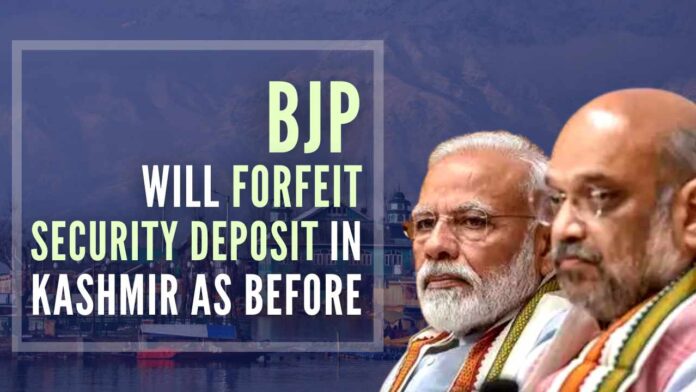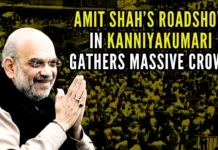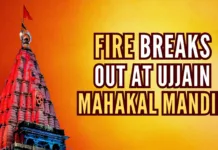
Exercise in self-deception
On Sunday (March 5, 2023), the J&K BJP held a meeting in Srinagar, Kashmir, to discuss organizational matters and the party’s poll prospects in the Valley. The meeting was chaired by the J&K BJP general secretary, and organization, Ashok Koul. It was he who reportedly told the participants that the party has “identified 10 Assembly constituencies in Kashmir in which the party can better its poll prospects in coming Assembly elections”.
Addressing the meeting, Koul also asked the party leaders to “emphasize strengthening the party at booth-level with Assembly election in UT J&K slated to be announced any time in near future”.
The ten constituencies identified by the BJP included “Habakadal, Eidgah, and Central Shalteng in Srinagar district, Tral in Pulwama district, Shopian assembly segment in Shopian district, Gurez in Bandipora district, Karnah in Kupwara district and Baramulla and Uri assembly segments in Baramulla district”.
The assertion of the BJP leadership that the “party can better its poll prospects in coming Assembly elections” clearly suggests that it is living in a fool’s paradise or in a world of the past. It can be termed an exercise in self-deception. The ground reality is that the BJP will forfeit security deposit not only in the 37 other Assembly segments in Kashmir but also in the 10 constituencies which it identified hoping that it could turn the tables on its political foes in the Valley. The reason: all the 47 Assembly constituencies in Kashmir are 100 percent Muslim and they are rabidly anti-BJP by conviction. The political foes of the BJP, which has zero support base in Kashmir, include the National Conference (NC) of Abdullahs, the People’s Democratic Party (PDP) of Muftis, the Congress of Sonia Gandhi/ Saif-ud-Din Soz/ GA Mir/ Vikar Rasool Wani, the People’s Conference (PC) of Sajad Lone, the Communist Party of India Marxist (CPIM) of M Y Tarigami and J&K Apni Party (JKAP) of Altaf Bukhari. All 47 seats will be shared between the NC, the PDP, the Congress, the PC, the CPIM, and the JKAP as and when assembly elections are held. These essentially subversive outfits are different only in name and they are one as far as their ideology and ultimate goal are concerned. They hate things in India and love Pakistan. They operate separately and from one platform at the same time or as per the exigency of the time. All, barring the JKAP, are also part of the “Gupkar Gang” of separatists and subversives. As said, the BJP will forfeit its security deposit in all the Kashmir assembly constituencies as before. There should be no doubt about it.
Subversive outfits’ poll prospects in Jammu
The delimitation commission has increased the number of Assembly seats in Jammu province from 37 to 43. There are 30 to 32 constituencies that are overwhelming Hindu-majority. The Kashmiri subversive parties – the NC, the PDP, the Congress, the JKAP, the PC, and the CPIM — have a very limited support base in these constituencies, which are located in Kathua, Samba, Jammu, Udhampur, Reasi, and Rajouri districts. Then, there are certain constituencies in the erstwhile Doda district, which now stand trifurcated into Doda, Kishtwar, and Ramban districts, where the support base of these parties has shrunk. This became evident in the 2014 Assembly elections when the BJP sprung a big surprise by winning six out of eleven seats. The Hindu and Muslim population in the Doda, Kishtwar, Ramban, and even Rajouri district is almost evenly balanced. Poonch district in Jammu province is the only district that is almost 95 percent Muslim and where the writ of the Kashmiri parties has been running ever since 1951, despite the fact that the successive Kashmiri-dominated governments in the state never dispensed justice to the people of this district like other remaining nine districts in Jammu province.
To be more precise, the demographic profile of the Jammu province’s hilly and mountainous districts is such that the Kashmiri parties would win at least ten seats and their tally in the 90-member House could be between 57 and 59. This would automatically mean retransfer of the state power to the Kashmiri parties, which have already made it loud and clear that they would leave no stone unturned to nullify the reform scheme as applied by the Narendra Modi government in J&K after its reorganization and after the abrogation of J&K’s special status on August 5-6, 2019. Indeed, the retransfer of the state power to them would be followed by grave evils and one can only hope and pray that the think tanks of the Narendra Modi government would keep all this in mind while toying with the idea of assembly elections in J&K. Statesmanship demands statehood for Jammu province and conversion of Kashmir into a Chandigarh-type UT to ensure that the state power doesn’t return to separatists and half-separatists in Kashmir and also to ensure that the problem of separatism and communalism remained confined to the Kashmir Valley.
BJP and Jammu
The BJP and its earlier incarnations the J&K Praja Parishad (PP) and the Bhartiya Jan Sangh (BJS) were popular in the Hindu-majority constituencies for reasons not really difficult to fathom. The most important one was that these parties consistently opposed the politics of communalism, secessionism, greater autonomy, and self-rule in Kashmir and worked for the state’s full integration with India, and highlighted discrimination in Jammu province. Even though the Hindus vouched for what the PP, the BJS, and the BJP seemingly worked for and fought for, these parties were called the parties of Jammu city’s “Kachi Chowni, City Chowk and Raghunath Bazar”. They would win only a couple of seats in the Jammu province. It was only in 1996 that the BJP could win eight seats in the 87-member house. In 2002, its tally came down to solitary one. It was in 2008 that it won eleven seats. It won so many seats as a result of the over two-month-long massive Shri Amarnath Land Movement. However, it was in 2014 that the BJP created a history of sorts and won 25 seats, all in Jammu. It would have won at least 5 seats more, had it distributed tickets taking into consideration the popularity or unpopularity of the candidates. Take, for example, the Udhampur Assembly constituency.
The murder of the mandate
The 2014 mandate was not really a mandate for the BJP. It was actually a vote for the Narendra Modi government. However, the BJP subverted the mandate for the sake of some loaves and fishes of office. It diluted its ideology on March 1, 2015, to become a union partner in the hardcore separatist Mufti Sayeed-led PDP-BJP coalition government. It became a junior partner and C-team of the Muftis, even though both the BJP and the PDP had won an equal number of seats. The PDP had won all 25 seats in Kashmir.
As was expected, the BJP soon lost its sheen and appeal in its core constituency. The “PDP-BJP agenda of alliance”, the ruthless manner in which the Muftis implemented their subversive agendas and caused a grievous injury to the paramount national interest, and the way the BJP ministers bungled at regular intervals and failed Jammu province in their desperate bid to remain on the side of the Muftis all worked against the BJP. A reference to just the BJP minister’s two statements in and outside the Assembly would be enough to indicate the extent to which the BJP compromised its ideology and hurt its own core constituency, Jammu. One, “India is using our (read J&K’s) land and water”. And, two, “no power on earth can snatch AIIMs from Kashmir”. The Modi government had sanctioned the AIIMS to Jammu but CM Mufti Sayeed decided to set up it in Kashmir.
Hope belied
No wonder then that it became quite unpopular in its own core constituency. Things for the BJP improved after June 2018, when the bigwigs in the BJP, including the PM and Home Minister Amit Shah, dislodged the Mehbooba Mufti-led PDP-BJP coalition government. Withdrawing support to the Mehbooba Mufti-led government, the BJP said that it had become a threat to national security and it had failed to hand down fair governance to Jammu and Ladakh. The things for the BJP further after August 5-6, 2019, when the Modi government divided J&K into UT of J&K and UT of Ladakh and brought the whole strategic region bordering China and Pakistan under the ambit of the Indian Constitution by abrogating separatist and discriminatory Articles 35A and 370 and bringing the entire Kashmiri leadership, both separatist and the so-called mainstream, to the nation’s knees. The bulk of the Jammu population celebrated these developments as a thanksgiving day. There was jubilance. There was a new hope.
However, the powers-that-be, including the South and North Blocks and J&K’s Raj Bhawan belied all Jammu’s hopes. They did do away with J&K’s special status, introduce all the Central laws in the UT and bring the region under their direct rule, but they didn’t really reform, restructure and Indianise the archaic, rotten, and fundamentally anti-Jammu and patently Kashmir-centric administrative apparatus. As a result, the biased administration created widespread disappointment and dissatisfaction among all, except in a limited circle of those close to the corridors of power. The local BJP leadership could have played a positive role by taking up the issues afflicting the people of Jammu province, but it miserably failed. The position right now is that the anti-BJP wave has gripped the entire Jammu province.
Silver-lining
The only silver-lining for the BJP is that an overwhelming majority of Hindus in Jammu province hate the Kashmiri parties from the core of their heart. They term these parties not just “anti-India and pro-Pakistan and pro-China”, but also “anti-Jammu and anti-Hindu”. Besides, the memories of what the successive Kashmiri-dominated and Valley-centric governments in the state did to Jammu province and to the Hindus in particular between October 1947 and June 2018 are still too fresh to be forgotten. These memories continue to linger in their mind.
The point is that PM Modi is the compulsion. However, it would be suicidal for the BJP to take this compulsion to mean no challenge to it in the Hindu-majority assembly constituencies. It must not forget that the Ikkjutt Jammu Party (IJP) has been working hard to provide a credible alternative to the people of Jammu province, who have been chaffing and seething with anger, and its watchword and battle cry is the separation of Jammu province from Kashmir and full state status to Jammu province – the most cherished dream of the bulk of Jammu’s population.
Note:
1. Text in Blue points to additional data on the topic.
2. The views expressed here are those of the author and do not necessarily represent or reflect the views of PGurus.
PGurus is now on Telegram. Click here to join our channel and stay updated with all the latest news and views
For all the latest updates, download PGurus App.
- ‘Kashmir My core constituency’: Revisiting July 12, 2003 to understand politics, Omar Abdullah-style - March 15, 2024
- Total deviation from traditional approach: Seven takeaways from PM Modi’s March 7 Srinagar visit - March 9, 2024
- Status of political parties: Why is further J&K reorganization imperative? - March 1, 2024











I agree with the author. BJP is making a big mistake, and will undo whatever the progress the center has made in the last few years. Best option is to give a statehood to Jammu and keep Kashimir as a union territory under the center’s rule.
Good news….. Vasudev Kutumb